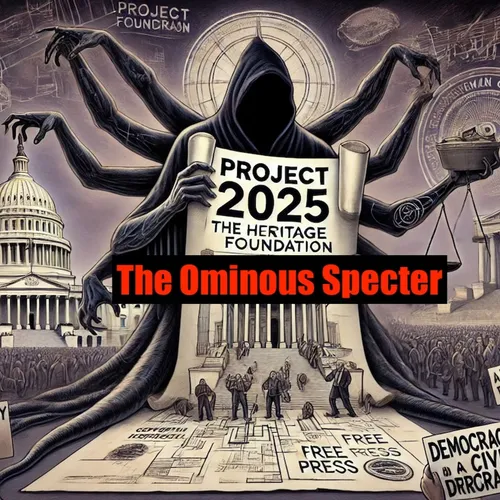The Radical Overhaul: Project 2025's Sweeping Vision for the Future of American Governance
- Author
- Quiet.Please
- Published
- Tue 14 Jan 2025
- Episode Link
- https://www.spreaker.com/episode/the-radical-overhaul-project-2025-s-sweeping-vision-for-the-future-of-american-governance--63693019
As I delved into the intricacies of Project 2025, a sweeping initiative crafted by the Heritage Foundation, I was struck by the sheer breadth and depth of its proposed changes to American governance. This is not just a policy blueprint; it is a vision for a fundamentally different United States, one that aligns closely with conservative ideals and the legacy of the Trump administration.
At its core, Project 2025 is a four-pillar initiative: a policy guide for the next Republican president, a database of potential personnel, a training program for these candidates, and a playbook for actions to be taken within the first 180 days in office. Led by former Trump administration officials Paul Dans and Spencer Chretien, this project has drawn both intense scrutiny and fervent support, depending on one's political leanings[3].
One of the most striking aspects of Project 2025 is its call for a radical restructuring of federal agencies. The Department of Education, for instance, would be abolished, with its responsibilities devolved to the states. This move is part of a broader push for school choice and parental control over education, reflecting a belief that education is a private rather than a public good. The federal government's role would be reduced to a mere statistics-keeping organization, with significant curtailment of civil rights enforcement in schools. The proposal explicitly rejects the pursuit of racial parity in school discipline, prioritizing student safety over equitable treatment[1].
The Department of Homeland Security would also face significant changes, with Project 2025 advocating for its dismantling. This would be accompanied by a stringent immigration policy, including the arrest, detention, and mass deportation of illegal immigrants and the deployment of the military for domestic law enforcement. The project's authors argue that such measures are necessary to restore order and enforce the rule of law, but critics see these proposals as draconian and inhumane[1][2].
In the realm of healthcare, Project 2025 proposes substantial cuts to Medicare and Medicaid, while urging the government to explicitly reject abortion as healthcare. The plan also seeks to eliminate coverage of emergency contraception and use the Comstock Act to prosecute those who send and receive contraceptives and abortion pills. This stance is part of a broader effort to align healthcare policy with conservative moral values, a move that has sparked fierce opposition from reproductive rights advocates[1].
The project's vision for science and research is equally transformative. It prioritizes fundamental research over applied science, arguing that many current programs act as subsidies to the private sector. Climate change research would be significantly curtailed, with the U.S. Global Change and Research Program facing critical analysis and potential dismantling. The Environmental Protection Agency (EPA) would be restricted from using certain climate change projections, and its scientific activities would require clear congressional authorization. These changes reflect a skepticism towards climate science and a preference for fossil fuels over renewable energy[4].
Project 2025 also seeks to centralize executive power, advocating for the elimination of civil service protections and the placement of the entire federal bureaucracy under direct presidential control. This is based on the unitary executive theory, which argues for a more streamlined and efficient government. However, critics warn that this could lead to a dangerous concentration of power in the White House, undermining the independence of critical agencies like the Department of Justice and the Federal Communications Commission[1][2].
The impact on civil rights is another area of significant concern. Project 2025 labels diversity, equity, inclusion, and accessibility (DEIA) initiatives as "managerialist...
